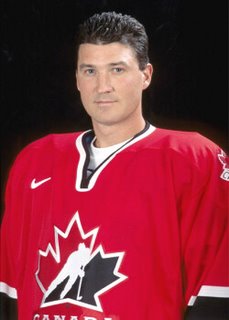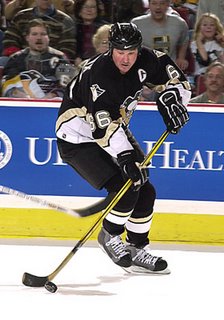Mario Lemieux, A Canadian and American Hero

Recently I rediscovered the joys of pro hockey and began following the Tampa Bay Lightning just the year before they won the last Stanley Cup series. In the mid-1970’s I had gone from being the world’s biggest hockey fan (Bruins) to being totally turned off - to the extent that I never watched another hockey game from then until 2003. That was the result of three things: anger at the Boston Bruins’ new owners for the way I perceived they had treated Bobby Orr, disgust at the mediocrity of the game after the big expansion of teams, and frustration with the helmets after years of being able to see the faces of players I idolized.
I never, therefore, had a chance to see the great Gretsky in action, and only got glimpses of the unbelievable Mario Lemieux. It has now become apparent that this great player, Lemieux, certainly one of the five all-time greats, has finally succumbed to age and sickness and will never play again. His life has been an incredible example, not only of athletic talent, but of determination and grit that can be an inspiration to anyone afflicted with disabling ailments. You just don’t ever give up if there is any chance at all.
He played through and came back from a ruptured disc and sciatica (both of which I know from personal experience are disabling, incredibly painful afflictions), from Hodgkin’s disease (a form of cancer) and from a serious heart ailment. He not only led his team in the fastest, toughest sport there is, he saved the team by buying and running it.
Lemieux, Mario, 1965–, Canadian ice hockey player, b. Montreal. A star for the Pittsburgh Penguins during 12 seasons, he was the team's first pick in the 1984 National Hockey League (NHL) draft and was Rookie of the Year. He led the Penguins to their only Stanley Cups (1991, 1992) and was a three-time winner of the Most Valuable Player Award (1988, 1993, 1996). Plagued by back injuries, he was also diagnosed with Hodgkin's disease in 1993. After treatment, he played during 1993–94, took 1994–95 off, and returned for the 1995–97 seasons. In 1997 he retired with a total of 613 goals, 1,494 points (leading the league in scoring for six seasons), and 881 assists in 745 games. He was elected to the Hockey Hall of Fame that year. In 1999, Lemieux headed an investment group that bought the Penguins, and he returned to play in the 2000–2001 season, scoring 35 goals as he led his team to the playoffs.
As one of the greatest to ever play the game, Lemieux has acquired nicknames such as "Le Magnifique", "The Magnificent One", and "Super Mario" while his surname literally means "the best." Due to his skill, size and stature (6 ft 4 in (1.931 m) and 230 lb (104 kg)), many analysts believe he could be great in any era. Lemieux is also the first active major sports league player in modern times to own a significant stake of his team. Position: Centre.
________________________________________
January 20, 2006
Team for Sale, and Lemieux Says He May Be Done
By JASON DIAMOS
PITTSBURGH, Jan. 19 - Mario Lemieux announced Thursday that he and his ownership partners were entertaining offers to sell the Penguins, and he did not rule out the possibility that he had played his last N.H.L. game.
Lemieux, the 40-year-old Hall of Famer who also serves as the team's captain, missed his 15th consecutive game Thursday night because of an irregular heartbeat. He also missed four games in early December with the condition, which is known as atrial fibrillation.
In his owner's box before Thursday night's game here against the Rangers, Lemieux was asked if he wanted to play again this season. "I'm not sure," he said. "I'm just taking it day by day now, hopefully start to feel better, and we'll see."
Lemieux, who came out of retirement in December 2000, was also asked if there was a chance he had played his last game. "Well, there's always a chance," he said.
Lemieux was inducted into the Hockey Hall of Fame in 1997. When he assumed control of the Pittsburgh franchise in September 1999, he was owed $20 million by the Penguins. The team had gone into bankruptcy in 1998.
The franchise continues to struggle. The Penguins are 11-27-9, the second-worst record in the 30-team league, ahead of St. Louis. Lemieux, who overcame Hodgkin's disease earlier in his career, said he did not know if the stress surrounding the team had contributed to his health problems.
"I'm not sure," he said. "The thing that I have now - atrial fibrillation - might be attributed to stress, and I've been getting a lot of stress the last couple of years. But you can't say for sure that's the problem."
What he did say was that the time had come to sell the franchise. The team's future in Pittsburgh hinges on whether a coalition assembled by the Penguins is awarded a license to run a slots parlor that could finance a $290 million project to build a new arena.
"I wanted to make sure, first of all, that we put the franchise in the best position to have a chance to stay here forever, and I feel that we're there," Lemieux said.



0 Comments:
Post a Comment
<< Home